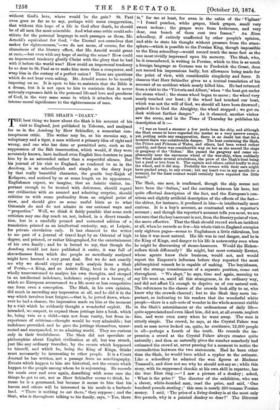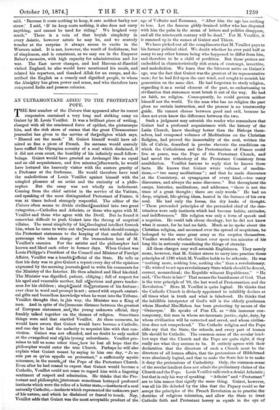THE SHAH'S " DIARY " rE best thing we know about the
Shah is his account of his visit to England, just published in Teheran, and analysed for us in the Academy by Herr Schindler, a somewhat con- temptuous milk. The writer may be, as his enemies say, a voluptuary and a tiger, a man without a primary idea of right and wrong, and one who has done or permitted acts, such as the suppression of the Bab insurrection, which would, if they were accurately known, have inclined even English lion-hunters to pass him by in an astounded rather than a respectful silence. But his journal of his visit to England, as rendered to us in the Academy, is as schoolboyish and simple as the diary kept by that really beautiful character, the gentle boy-Rajah of Kolapore, and noticed by us at some length on its appearance. Englishmen expect, we imagine, that an Asiatic visitor, im- portant enough to be treated with deference, should regard our civilisation with an amazed and admiring surprise, should criticise us with some profundity from an original point of view, and should give us some useful hints as to what Orientals do and do not admire in our national ways and "properties." Well, we think it fairly possible that some such criticism may one day reach us, not, indeed, in a direct transla- tion, but in a carefully pruned and corrected edition of a translation printed as an intellectual curiosity, say, at Le-ipsic, for private circulation only. It has chanced to the writer to see part of a journal of travel kept by an Oriental of high degree, and printed, or rather lithographed, for the entertainment of his own family ; and he is bound to say, that though the Academy would not have published it entire, it was full of shrewdnesses from which the people so mercilessly analysed might have learned a very great deal. But we do not exactly see why we should expect any such analysis from a Shah of Persia,—a King, and an Asiatic King, bred in the purple, wholly unaccustomed to analyse his own thoughts, and steeped in an intellectual indolence, indolence enjoyed as a luxury, of which no European accustomed to a life more or less competitive can form even a conception. The Shah, in his own opinion, did much in recording any impression at all, and he did it in the way which involves least fatigue,—that is, he jotted dawn, when- ever he had a chance, the impression made on him at the moment by a visit which he evidently thought a wonderful exploit. He intended, we suspect, to expand these jottings into a book, which he, being vain as a child—vain not from vanity, but from in- experience of criticism—thought would be very admirable ; but indolence prevailed, and he gave the jottings themselves, uncor- rected and unexpanded, to an admiring world. They are curious only in their truthfulness. The Shah did not speculate or philosophise about English civilisation at all, but was struck, just like any ordinary traveller, by the events which happened to himself, and which he, being the King of Kings, thinks must necessarily be interesting to other people. It is a Court Journal he has written, not a passage from an autobiography. Events which happen to him are historical, not the events which happen to the people among whom he is sojourning. He records his meals over, and over again, describing with some care the things he got to eat, not as Herr Schindler seems to think, be cause he is a gourmand, but because it seems to him that his harem and others will be interested in his meals in a barbaric land. "There is nothing to eat there," they suppose ; and the Shah, who is throughout talking to his family, says, "Yes, there is," for me at least, for even in the cabin of the 'Vigilant' "I found peaches, white grapes, black grapes, small very sweet melons ; the grapes were from hothouses, and very dear, one bunch of them cost two francs." An Eton schoolboy, if entirely unaffected by other people's opinion, and able to state his thought without pressure from the atmo- sphere--which is possible to the Persian King, though impossible to the Eton schoolboy—would record mach the same fact as the one most vividly impressed upon his memory. The Shah, who, be it remembered, is writing in Persian, which to him is as,rauch a foreign language as German was to Frederick the Great, does not record his impressions badly, but allowance being made for the point of view, with considerable simplicity and force. It chances that Herr Schindler gives us a textual translation of his account of an accident which nearly killed him. He had returned from a visit to the 'Victoria and Albert,' when "the boat got under the steam wheel ; the steam wheel began to move ; the wheel very nearly touched our boat ; if the wheel had touched our boat, which was not the will of God, we should all have been drowned ; praised be to God the Almighty, the wheel stopped ; we got on deck without further danger." As it chanced, another visitor saw the scene, and in the Times of Thursday 'he publishes his description of it :— " I was on board a steamer a few yards from the ship, and although the Shah seems to have regarded the matter as a very narrow escape, yet, putting aside any exaggeration, there is no doubt but that for a moment there was considerable danger. The boat containing the Shah, the Prince and Princess of Wales, and others, had been rowed rather quickly, and there was considerable way on her as she neared the stage or gangway of the Sultan.' She passed the gangway and came un- pleasantly near the enormous wheel of the war-ship, when suddenly the wheel made several revolutions, the prow . of the Shah's boat being but a yard or two from it. The captain and others called loudly to stop the wheel, and it did stop. Probably the rowers with their oars might have pushed away, in any event; but my heart was in my mouth for a moment, for the least contact would certainly have capsized the little launch."
The Shah, one sees, is confirmed, though the ship seems not have been the Sultan,' and the contrast between his hare, but quite effectual description of the fact, and the European's con- scious and slightly artificial description a the effects of the fact— the shiVer, for instance, it produced in him—is intellectually most curious. It is a boy's account, as contrasted with a reporter's account ; and though the reporter's account tells you most, we are not sure that the boy's account is not, from. the literary point of view, the more effective. That the ShaIrshould.record Buchan incident at all, when he records so few—his whole visit to England occupies only eighteen pages—seems to Englishmen a little ridiculous, but to him it was most natural. His life was in real danger, and he is the King of Kings, and danger to his life is noteworthy even when he might be discoursing of steam-hammers. Would the Hohen- zollern think differently? He might, but most certainly Reuter, whose agents know their business, would not, and would report the Emperor's influenza before they reported the most philosophical remark he is capable of making The boyishness, and the strange consciousness of a separate position, come out throughout. "We slept," he says, time and again, meaning to say life went on, amid all this strangeness, in its ordinary way, and did not affect Us enough to deprive us of our natural rest. The references to the cheers of the crowds look silly to us, who know why the crowds cheered ; but to the Shah they seem im- portant, as indicating to his readers that the wonderful white people—there is a sub-note of wonder in the whole account visible in the Shah's astonishment at the ordinariness of daily life— quite appreciatedand even liked him, did not, at all events, neglect him, and were even sorry when he went away. The man is utterly simple. The crowd, he says, at the Crystal Palace was such as man never looked on, quite, he continues, 12,000 people in all—perhaps a fourth of the truth. He records the im- pression a crowd at the Crystal Palace always creates quite naturally ; and then as naturally gives the number somebody had estimated the crowd at, never pausing for a moment to notice the contradiction between the two statements. Had he been other than the-Shah, he would have added a cypher to the estimate. Like a schoolboy he admired the wax figures at Madame Tuasaud's, and does not see why he should not say so ; while this story, with its suppressed chuckle at his own skill in repartee, has the true Eton ring :—" I saw a picture of a donkey ; asked, What is the price ?' The director of the exhibition, who was a clever, white-bearded man, read the price, and said, 'One hundred pounds sterling ;' this sum is nearly 250 tomans Persian money. I said, The price of a living donkey is at the most only five pounds, why is a painted donkey so dear?' The Director
said, Because it costs nothing to keep, it eats neither barley nor straw.' I said, If its keep costs nothing, it also does not carry anything, and cannot be used for riding.' We laughed very much." There is a vein of that boyish simplicity in every Asiatic, however astute he may be, and we scarcely wonder at the surprise it always seems to excite in the Western mind. It is not, however, the result of foolishness, but of simpleness, and is consistent, as we may see in the Emperor Baber's memoirs, with high capacity for administration and for war. The East never changes, and had Haroun-al-Raschid visited England, he also would have mentioned his meals, and related his repartees, and thanked Allah for an escape, and de- scribed the English as a comely and dignified people, to whom the Almighty has given power and sense, and who therefore have conquered India and possess colonies.







































 Previous page
Previous page